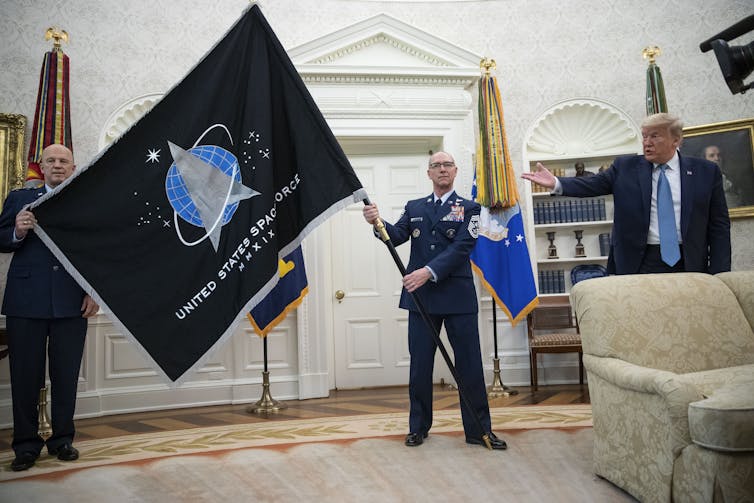The next president of the United States could be the first in that office to accept a phone call from the Moon and hear a woman’s voice on the line. To do so, they’ll first need to make a series of strategic space policy decisions. They’ll also need a little luck.
Enormous government investment supports outer space activities, so the U.S. president has an outsize role in shaping space policy during their time in office.
Past presidents have leveraged this power to accelerate U.S. leadership in space and boost their presidential brand along the way. Presidential advocacy has helped the U.S. land astronauts on the surface of the Moon, establish lasting international partnerships with civil space agencies abroad and led to many other important space milestones.
But most presidential candidates refrain from discussing space policy on the campaign trail in meaningful detail, leaving voters in the dark on their visions for the final frontier.
For many candidates, getting into the weeds of their space policy plans may be more trouble than it’s worth. For one, not every president even gets the opportunity for meaningful and memorable space policy decision-making, since space missions can operate on decades-long timelines. And in past elections, those who do show support for space initiatives often face criticism from their opponents for their high price tags.
But the 2024 election is different. Both candidates have executive records in space policy, a rare treat for space enthusiasts casting their votes this November.
As a researcher who studies international affairs in outer space, I am interested in how those records interface with the strategic and sustainable use of that domain. A closer look shows that former President Donald Trump and Vice President Kamala Harris have used their positions to consistently prioritize U.S. leadership in space, but they have done so with noticeably different styles and results.
Trump’s space policy record
As president, Trump established a record of meaningful and lasting space policy decisions, but did so while attracting more attention to his administration’s space activities than his predecessors. He regularly took personal credit for ideas and accomplishments that predated his time in office.
The former president oversaw the establishment of the U.S. Space Force and the reestablishment of the U.S. Space Command, as well as the National Space Council. These organizations support the development and operation of military space technologies, defend national security satellites in future conflicts and coordinate between federal agencies working in the space domain.

While president, Donald Trump oversaw the creation of the U.S. Space Force.
AP Photo/Alex Brandon
He also had the most productive record of space policy directives in recent history. These policy directives clarify the U.S. government’s goals in space, including how it should both



